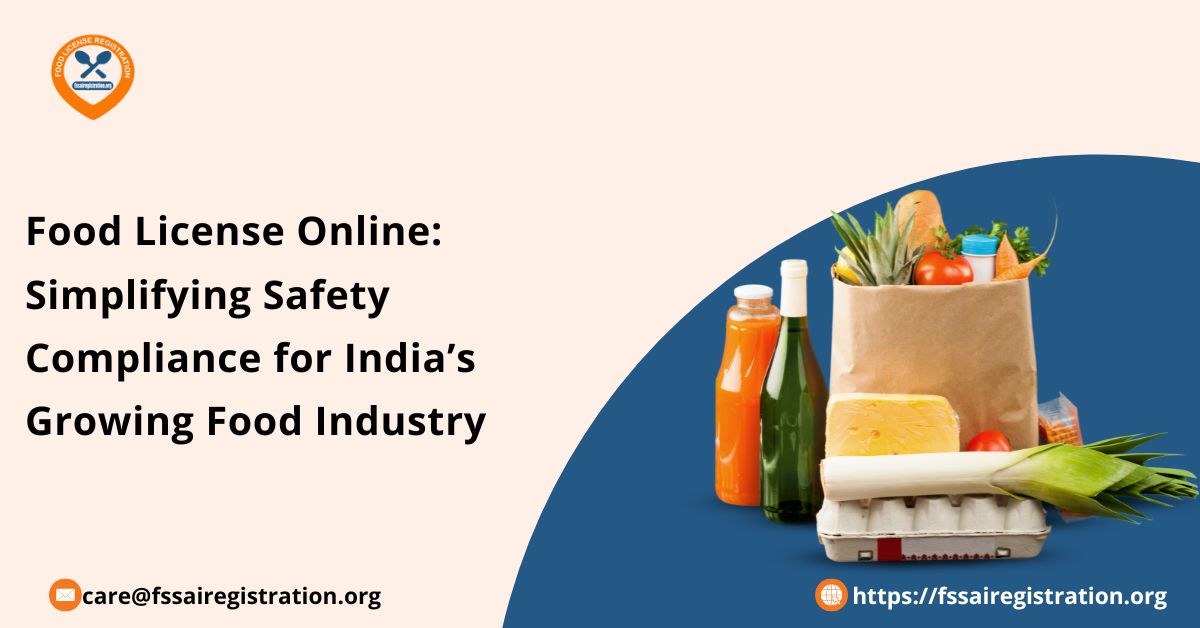India’s food industry is experiencing exponential growth, with everything from cloud kitchens and street food carts to organic health brands and gourmet restaurants booming across cities and small towns alike. But as opportunities grow, so does the responsibility to serve food that’s safe, hygienic, and trustworthy. One essential step toward this is obtaining a Food License Online, governed by the Food Safety and Standards Authority of India (FSSAI).
What is a Food License?
A Food License, also known as an FSSAI License, is a mandatory legal certificate required for anyone operating in the food industry in India. It ensures that food sold to consumers complies with national safety and hygiene standards.
It is governed by the FSSAI (Food Safety and Standards Authority of India), an autonomous body under the Ministry of Health and Family Welfare.
Why is a Food License Required?
Getting a food license isn’t just a regulatory formality—it provides many tangible benefits:
Legal Permission
- It’s mandatory by law under the FSS Act, 2006.
- Selling food without it is punishable by fines and imprisonment.
Trust & Transparency
- Customers feel safer buying from licensed businesses.
- It adds credibility to your brand.
Who Needs a Food License?
The requirement applies to anyone involved in food-related activities, such as:
Food Preparers
- Restaurants, cafes, dhabas
- Cloud kitchens, home chefs
- Canteens, catering businesses
Food Manufacturers
- Packaged food brands
- Snack producers, bakeries
- Ice cream, soft drink units
Traders & Retailers
- Grocery stores, supermarkets
- Wholesale distributors
- Online food sellers
Food Transport & Storage
- Cold storage warehouses
- Transporters of perishable items
Food Importers/Exporters
- Entities dealing in international food trade
Even a street food vendor or tiffin service must have basic registration if they are selling food to the public.
Types of Food Licenses in India
Food licenses are classified into three types based on the size and nature of the business:
Basic FSSAI Registration
- For small businesses
- Turnover: Up to ₹12 lakh/year
- Suitable for:
- Home food sellers
- Small stalls and hawkers
- Petty retailers
FSSAI State License
- For mid-sized businesses
- Turnover: ₹12 lakh to ₹20 crore/year
- Suitable for:
- Medium restaurants
- Small-scale food processing units
- Medium-sized traders and storage units
FSSAI Central License
- For large businesses or those with operations in multiple states
- Turnover: Above ₹20 crore/year
- Suitable for:
- Exporters/importers
- Large manufacturers
- National food chains
- Food product suppliers to government institutions
Documents Required for Food License Online
The documentation depends on the type of license. Here’s a general list:
For Basic Registration:
- Applicant’s photo
- Aadhaar or PAN card
- Address proof
- Business name and details
- Type of food items sold
For State/Central License:
- Form B (filled and signed)
- PAN and Aadhaar of the owner/partner
- Business registration certificate
- Layout of the premises
- List of food products handled
- Water testing report
- NOC from the municipal/local body
How to Apply for a Food License Online (Step-by-Step Guide)
Visit the FSSAI Website: Go to the official FSSAI registration portal online.
Fill in Basic Details: Enter your personal and business details—like your name, phone number, email, business name, type of food you deal with, business type, and full address.
Upload Your PAN Card: Add a scanned copy or photo of your PAN card as part of the application.
Double-Check and Submit: Review all your information to ensure it’s correct, then click the "Submit" button.
Pay the Registration Fee: Pay the applicable fees online using UPI, debit/credit card, or net banking. The fee depends on your license category.
OTP Verification Call: Our team will call you to verify your mobile number or email using a one-time password (OTP).
Inspection (If Needed): In some cases, FSSAI officers may visit your premises for a quick inspection.
Get Your License: After approval, you can download your FSSAI license from the website.
Benefits of Having a Food License
Legal Safety: Stay protected from fines, legal notices, or business closure.
Consumer Confidence: Boosts your brand’s reputation and builds customer trust.
Business Growth: Required for applying to sell on e-commerce platforms or opening multiple outlets.
Financial Assistance: Needed to get bank loans, funding, or subsidies from the government.
FSSAI License in Numbers (as of 2024)
- Over 65 lakh+ registered food businesses
- 500+ food safety inspectors across India
- 100+ labs for testing food samples
- 5 lakh+ licenses issued via FOSCOS since 2021
How FSSAI Supports Digital India
The new FOSCOS platform (Food Safety Compliance System) is fully digital, allowing:
- Paperless registration
- Online inspections and compliance reports
- Tracking and status alerts
- Easy access for small and rural businesses
It supports India’s goals for "Ease of Doing Business" and making India’s food industry more reliable and globally competitive.
Suggested read:- FSSAI Food safety license registration for fish exporters in India
Final Thoughts
Food licensing may seem like a small step, but it plays a huge role in shaping India's food industry. Whether you run a five-star restaurant or a home kitchen, having a food license shows that you're committed to hygiene, safety, and customer care.
With the online system now fully functional and user-friendly, there’s no excuse not to register. It’s your legal duty, your brand booster, and your ticket to growth.





Comments